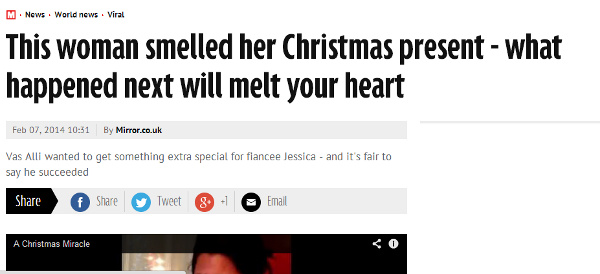The Rise of Emotoporn and 21st Century Grief
August 10, 2014 in General Topics
Americans have a problem. We’ve been bombarded and over-saturated with information to a greater extent than our ancestors. Our fading idealism is on display on Facebook; our angst is broadcasted within Twitter’s character limit. We are a generation that encounters soft-core smut as click-bait on news websites, and we’re driven to consume #trendinghashtags and viral videos. We’re not only living through Andy Warhol’s famous claim, but propagating it in status updates and the almighty share button. We’re wallowing in a constantly-connected world that has geared us to expect short bursts of hyper-focused data.
“Just one more click,” the Internet says.
We are now trained to see the world as a stream of content. And yet, we are increasingly disconnected from that world, experiencing it more and more through a screen accessible everywhere we go. The 21st century digital boy compulsively checks his smartphone. If he isn’t addicted to porn, there’s a fair chance that he’s addicted to the Internet in general, but he’s largely a functional addict, and so it goes.
Millenials are particularly cynical and lonely, understandably, and they’ve swelled the ranks of an increasingly isolated and depressed America. This America is now exploring a brand-new stimulant, something that satisfies both the endless desire to click while also providing an illusion of what so many are desperately craving–emotional connection.
Emotoporn is on the rise all over the Internet. If you’ve been anywhere online, you’ve seen it. The stuff’s headlines read a bit like sales pitches from a dealer hocking narcotics, promising that this hit will be the one you can’t miss. Here’s three quick results from a cursory Google search for one of the most common phrases used in these articles (in this case, “will melt your heart”):
This sort of article has a lot of appeal to the people publishing it. Such an article is a sure-fire traffic and revenue generator, especially if one can set up multiple related photos as a slideshow, with outbound links populated on every click. The headlines themselves are designed to grab attention when they’re inevitably shared across social media, to snare the focus of a people conditioned to filter and propagate a content feed.
But they also speak to the mindset of those behind these articles. Witness now a world where emotion itself has become content; just another digital commodity. The people selling emotoporn offer the browser a hit of genuine connectivity with the rest of the human race. It’s an empty promise, a temporary fix, like porn’s pale subsitution for intimacy.
There’s another interesting aspect of this phenomenon: those often at the center of these stories.
Americans in the 21st century, now feeling obligated to share everything, are further breaking from their ancestors by taking grief and turning it into some kind of public exhibition. There was a time in this country that you bore your loss largely within the family, or within private. You could usually count on a close support structure. Perhaps it’s telling that these days even the loss of a pet has become something deemed newsworthy and worth reading about (provided that all-important emotional hit can be guaranteed for the hungry audience).
We’ve always had content like this in the major news outlets, yes–usually occupying that space right before the newscast was over. But have we ever had such a deluge of it?
Of course I don’t want to imply that I’m disapproving or not sympathetic to very real losses encountered by those in these articles. Rather, I’m illustrating a sign of a changing culture. Human beings have always created media that attempts to draw the reader or viewer in as an active participant in an emotional experience. But contemporary Americans seem to be starving for such stuff, and the narratives they construct when they’re at the fulcrum of these stories illustrate a kind of psychological headiness.
It’s not enough to lose a dear neighbor, for example, and call some friends for support. Our Internet-based culture seems to produce people that plunge themselves into that loss with everything they have, so that no scrap of that poignant experience might be lost.
A sympathetic party from the Greatest Generation might have invited the mourning wife of a recently-departed friend over for dinner, and promised steady, quiet support. In 2014, said wife and friends might be inclined to make a thirty-foot statue and decorate it with grayscaled photos culled from a Facebook page. This is the stuff of our mourning, but is such a thing only a beautiful gesture, or is it a beautiful gesture partially encouraged on by seeing others do similar such acts?
After all, if the Internet told us that this is how we weep, then these are tears, right?
What does emotoporn and the Internet’s version of modern grief mean for an isolated people? Is all of this an indication of decency, or distraction?




Recent Discussion